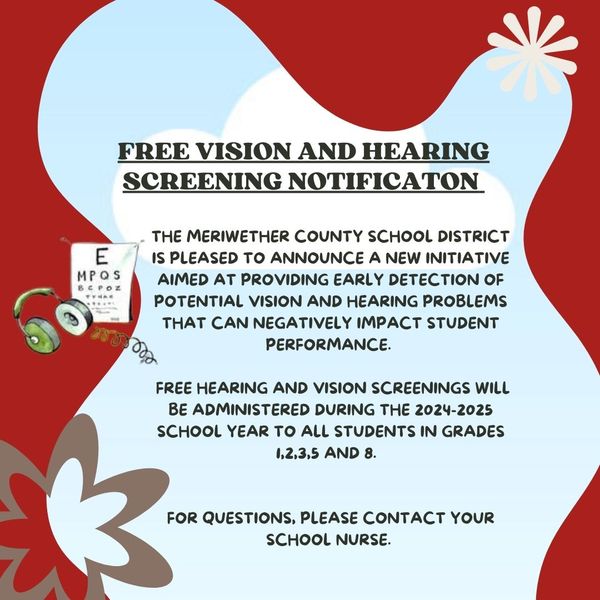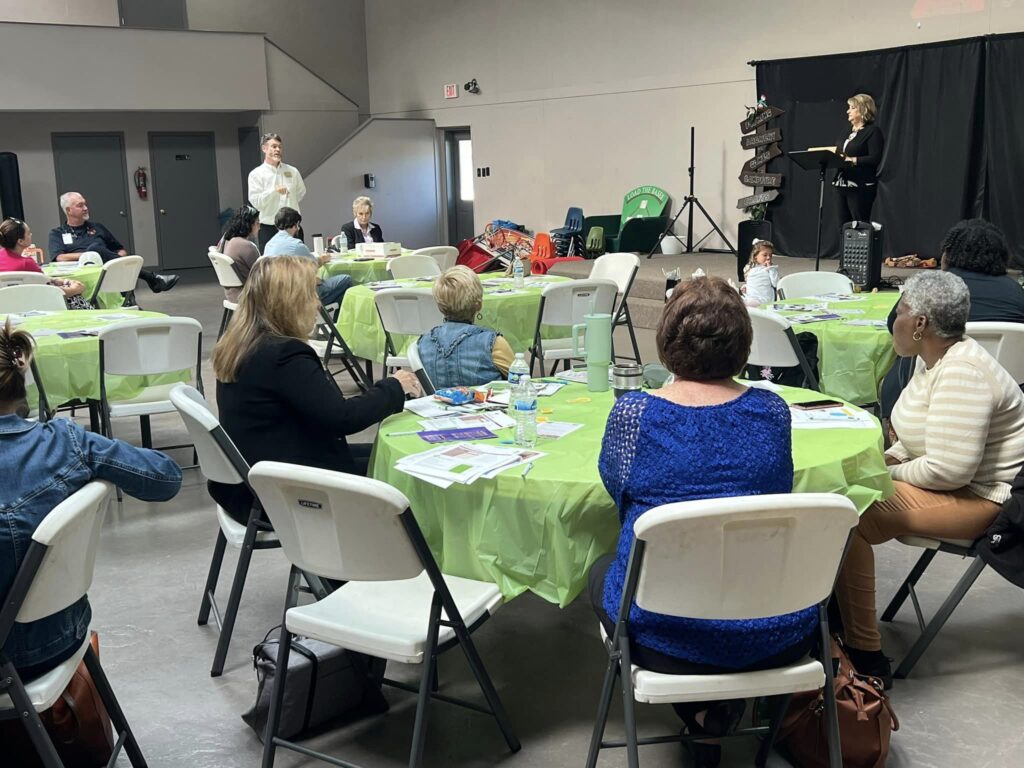An Ounce of Prevention is Worth a Pound of Cure
Meriwether County Tackles Vision, Hearing, and Other Health Barriers to Support Children’s Literacy and Learning

By Sarah Torian
When Literacy for Learning, Living and Leading Georgia (L4GA) grantees convened in fall of 2023, Sian Lott, an L4GA program specialist with the Georgia Department of Education, explained that 80% of learning occurs through the visual processing of information—and 20-30% of children have some form of vision problem that could negatively affect literacy development if left uncorrected.
“Many children who are diagnosed with a learning disability or described as problem learners suffer from undetected or untreated vision and hearing problems,” said Lott, who also explained that even mild levels of hearing loss have a negative effect on literacy outcomes and approximately 15% of children have some level of hearing loss.
Georgia law requires that children show proof of a vision and hearing screening prior to enrolling in public school but does not address follow up when the screening indicates a need for further evaluation.
The American Academy of Pediatrics (AAP) recommends that vision screenings occur:
- during a physical examination at birth,
- around age 3,
- annually from ages 4-6; and
- at ages 8, 10, 12, and 15.
The AAP recommends that hearing screenings occur:
- during a physical examination at birth,
- at ages 4, 5, 6, 8, and 10 years; and
- between ages 11-14, 15-17, and 18-21 for additional screenings.
“That was a real a-ha moment for me,” said Dawn Woodard, director of federal programs for the Meriwether County School System. “I’m in my 36th year of teaching, and it was a great reminder that vision and hearing need to be on our forefront.”
This newfound knowledge was put into action for children in Meriwether County during a school district leadership meeting when Woodard shared how tackling vision, hearing, and other health barriers could support children’s literacy and learning.
New tools and strategies available to districts to support literacy instruction were already being applied in classrooms. District leaders recognized the importance of also addressing prevalent health barriers to learning that could stymie their efforts to support children’s literacy development.
“We asked a lot of questions during these early discussions,” Woodard recalled. “What can we do? How can we do this? How can we get partners? What’s the process going to look like?”
A task force was formed including Meriwether County Family Connection, Meriwether County Health Department, local ophthalmologists and audiologists, and members of the local L4GA partnership.
Because the county planned to use the i-Ready Dyslexia Screener to screen students for dyslexia, leveraging its preexisting investments in the i-Ready Diagnostic for reading, the county’s special education department had state funding to invest in other types of diagnostic tools. The district invested those dollars in vision and hearing screening equipment, committing to start screenings in fall of 2024.
With guidance from the health department, the district purchased state-of-the-art, noninvasive screening equipment. The health department led an intensive summertime training program for the six full-time school nurses—including two registered nurses and four licensed practical nurses—who serve the six Meriwether County schools. This training included an overview of the new equipment and ample opportunities to practice on it.
When the school year began this August, the district alerted families about this new opportunity. Many families lack access to these types of screenings in the expansive rural county of 21,000 residents where there are no pediatricians and driving from one end of the county to the other can take an hour.
“We sent home letters explaining why these early detection screenings are important and sharing how to identify any issues,” said Suze Neal, Meriwether County School District director of compliance. “We also posted flyers and information on social media because that’s where a lot of our middle and high school parents get information and respond.”
By the end of the first month of school, the nurses—with support from the health department staff—had completed the screening process for the targeted grade levels in the district’s smaller elementary school, which has 500 students.
“Everybody is very glad these screenings are taking place,” Neal said. “Families often don’t have the means to get their students to the doctor or eye doctor, so they’re grateful for these screenings.”
Students are being screened in the larger elementary school, which has more than 700 students. Then, screenings will begin for eighth graders in the county’s two middle schools.
The school district’s tagline is “Every Student Matters, Every Moment Counts.” According to Woodard, that’s been the driving force for this effort. “We initially planned to screen just first and second graders, but we decided to add kindergarten along with third and eighth grade,” said Woodard. “We knew we had to take the bull by the horns and be proactive.”
If screenings identify potential vision or hearing issues, the school notifies parents and provides referrals for follow-up assessments to be conducted by vision or hearing specialists. The district recognized that families may struggle to access or afford follow-up assessments, so they engaged local optometrists and audiologists who have agreed to serve families in need.
“There’s a doctor in Manchester I’ve called several times,” said Neal. “When we determine that a student can’t see well and doesn’t have the means to go to the eye doctor, all I need to do is get the parent’s permission and pick up the phone to call. Students can often get an appointment that same day and have even been provided with glasses.”
The impact this initiative will have on children’s literacy and school success may not be evident for a year or longer, but leaders know that an ounce of prevention is worth a pound of cure and are committed to taking actions now that will yield numerous benefits in time. They remain confident that tackling these health barriers to learning will help more students meet Georgia Milestones and achieve reading proficiency.
“It’s been amazing to witness communities like Meriwether actively respond to the data on the looming crisis of vision and hearing across the country and light a fire of action that’s addressing health barriers to learning,” said Lott. “Many teachers, parents, and others who care about children just don’t know about the impact this can have on children’s learning and development. It’s an honor to bring awareness and resources to this area of concern and witness districts breathe a sigh of relief as they’re able to finally understand why certain interventions weren’t working.”

Meriwether County Family Connection’s Growing Meriwether Together Strategy Team met recently.
“Meriwether’s ongoing population-focused and thoughtful approach to identifying health barriers to learning for the purpose of creating solutions illustrates the power of local collective action and the purpose of the Get Georgia Reading Campaign,” said Arianne Weldon, Get Georgia Reading Campaign for Grade-Level Reading Director.
Meriwether County’s focus on health barriers to learning started years ago when Meriwether County Family Connection combined efforts to improve women’s health and healthy births with a focus on early literacy—recognizing that preterm birth significantly reduces the likelihood of reading proficiency and increases the likelihood of chronic absenteeism and suspension.
“Now they’re expanding action to address health barriers to learning to include vision and hearing,” said Weldon. “Meriwether will keep advancing data-informed strategies that leverage the Campaign’s four pillars to drive action in ways that will benefit their children and entire community for years to come.”
Rhonda Denton, Meriwether County Family Connection executive director, said she looks forward to their future work centered on early literacy and promoting women’s health. Family Connection’s Growing Meriwether Together Strategy Team will meet soon to discuss their three-year strategy plan.
“The theme ‘Let’s Get Locked In’ is a strong call to action for building engagement and collaboration,” said Denton. “Fostering partnerships can truly amplify our efforts in Meriwether, and I hope it inspires more impactful initiatives that are crucial to our success.
